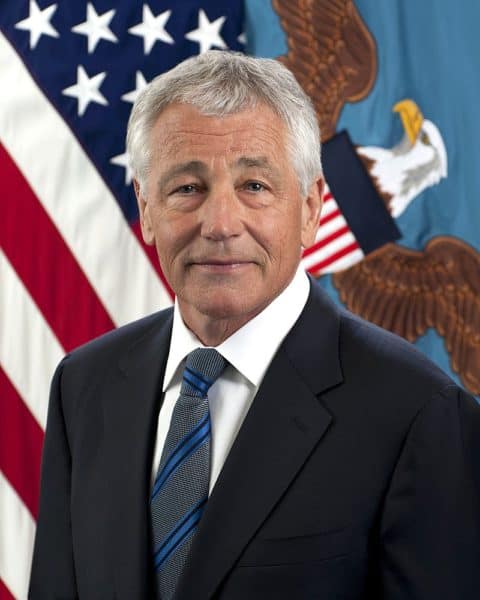More Mush From Our “Leaders”
Jared Taylor, American Renaissance, May 24, 2014
Yesterday, Secretary of Defense “Chuck” Hagel gave the commencement address at the Naval Academy. I wasn’t there, but I heard it on the radio and found the text on the Internet. It was miserable, effeminate mush — a pep talk for social workers in uniforms rather than a call to arms for future Marine Corps and Navy officers.

Secretary of Defense Chuck Hagel
First of all, Mr. Hagel hardly mentioned the profession Naval Academy graduates have presumably chosen: war. He did not evoke a single battle or engagement. He never referred to the past at all, or to anything we can learn from it. Mr. Hagel used more than 2,300 words but “sacrifice,” “devotion,” “patriotism,” “faith” or “faithfulness,” “tradition,” “hero” or “heroism,” and “glory” were not among them. He did use the words “courage” and “brave” — one time each — but not in the way you would expect.
What did Mr. Hagel talk about? Leadership. “Leader” or “leadership” occurs 19 times in this talk. “This period of uncertainty and transition will require exceptional leadership,” he explained, and then repeated himself for emphasis: “Exceptional leadership.”
He had three pieces of leadership advice: Know the people you are leading, try to understand different points of view, and be humble — the bromides graduates from a third-rate business school get at commencement.
But the three concrete examples of “leadership” he gave were astonishing. Here’s the first:
As a leader, you are a role model — maybe your biggest responsibility of all — and you have the power to inspire and encourage others to do the right thing.
For example, you will all be counted on to lead in helping eliminate sexual harassment and sexual assault of your sisters and brothers in uniform. You’ve seen what these crimes do to the survivors, their families, institutions, and communities. You know how they tear people and units apart, how they destroy the bonds of confidence and trust that lie at the very core, the center, the heart of our military.
In other words, leadership challenge number one for the Navy and Marine Corps is stopping sexual harassment.
Here is Mr. Hagel’s second example, drawn from his own experience in Vietnam in 1968:
We had racial differences. Discipline issues. The Army was in trouble in 1968. Our country was in trouble in 1968.
This young African American, our lieutenant — a lieutenant out of Chicago — came to our unit, and he stepped into the middle of this. And he brought everybody together — African Americans, whites, Hispanics. And he said, ‘No more of this. We’re in this together. We’re Americans first. We’re gonna work together. We’re gonna get along. We’re gonna fight together. And we’re gonna take care of each other. No more segregated tents. We’re together.’
And the force of this one young second lieutenant — African American, in a majority white unit — brought that unit together, that company together, like nothing I’d ever seen.
That’s leadership. That’s stepping up. That’s doing the right thing.
Setting aside whether this really happened, leadership challenge number two is getting blacks, whites, and Hispanics to fight the enemy rather than each other.
Mr. Hagel’s last example of leadership is about soldiers with mental problems or drug habits:
When they come to you for help, it doesn’t mean they’re weak. It means they’re strong. Because asking for help when you need it takes courage [the only time Mr. Hagel uses the word] and strength. . . .
These brave [the only time he uses the word] individuals don’t need to be avoided or stigmatized. They need to be embraced. They need to be helped. They need leaders, leaders with compassion and humility — leaders they know and trust, and will go the extra mile for them.
You will be that kind of leader.
So here are the Secretary of Defense’s three challenges of “exceptional leadership” for “this period of transition and uncertainty:” sexual harassment, racial conflict, and burned out soldiers.
This sort of fluff disgusts serious soldiers. No wonder the Navy is losing its best men: pilots and SEALs who are sick of lectures on “social issues” rather than fighting.
If we ever face a real enemy — say, China — it won’t even have the first two problems. It will have a one-race, all-male army that can concentrate on combat rather than hand-holding. And its “leaders” won’t be chosen because of their “compassion and humility” for shirkers, drug addicts, and crazies. They will be men who know how to find and kill the enemy.
The crowd should have laughed at Mr. Hagel, but of course it did not. I’m sure he went home very proud of himself. I’m also sure that by today, most of his audience doesn’t remember a word he said. If they do, it is probably his final piece of advice: “Work hard, but have some fun. Have some fun, too.”















